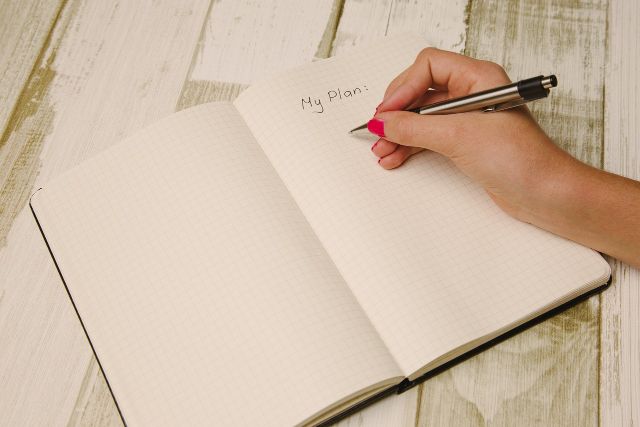How To Start A Journal Entry With Easy Steps
|
|
Time to read 9 min
|
|
Time to read 9 min
Journaling is an incredibly rewarding practice that improves your wellbeing and provides many other benefits. So if you’re interested in learning how to start a journal entry with easy steps, keep reading.
Table of Contents
Starting a journal is an admirable pursuit that can offer a multitude of benefits. Although it may feel like a chore at first, by committing to journaling you create a safe space for you to reflect, process your emotions and grow as a person. To help you along your path towards journaling, let’s go over how to start a journal entry by breaking it down into easy steps:
Writing in your journal can be encouraged by creating a space that allows the creative juices to flow. So find a quiet, comfortable location where you won’t be disturbed during your writing. This could be a cozy nook at home, a quiet part of a park or somewhere else that you find relaxing. By providing yourself with a dedicated writing space, you give yourself the best chance to write and reflect.
Another great way to lay the foundation for your journal writing is to establish a consistent schedule. By setting aside a specific time of day to write, such as first thing in the morning or just before bed, you solidify a routine. By sticking to this schedule, you’re much more likely to write consistently.
Finally, you’ll want to remember that the things you write in your journal are private. By ensuring that your work is private, you’ll feel much more comfortable about writing openly. So keep your journal safe and secure so that no one else can get to it.
A blank page in your journal can feel quite overwhelming, especially if you don’t know what to write about in the moment. So to help you decide on a topic, reflect on your day and think about the high’s, low’s and talking points of the day. You can also prompt yourself by asking questions like, ‘what made me happy or sad today?’. This should help guide your writing process.
If you’re really struggling to decide what to write about, then brainstorming is also a viable option. Think about things like your aspirations, a favorite book you’ve read recently or a social topic that’s been bothering you. You can even use external media like television shows or photographs to inspire your writing.
Framing your entry can give you some clarity around how you’ll write in your journal. A good way to start this is by creating an opening sentence that conveys your current mood or thoughts. Other ways to begin your entry is by using a quote you like, asking a question or making an observation. Be sure to add other key details alongside your journal entry, like the date to provide a bit more context and structure around your writing. You might also want to give each entry a title to clearly denote what you’re writing about.
The writing process itself will vary from person-to-person and page-to-page. So try not to overthink what you’re writing and let your ideas spill out onto the page. To help with this, you can try to write quickly to capture the essence of your thoughts. You won’t be filtering what you write as much if you do so quickly, providing you with a more genuine reflection of your thoughts and ideas.
Another important aspect of the writing process is honesty. Don’t feel compelled to sugar coat how you feel or write in a way that you think other people will enjoy. Your journal is a personal thing, so don’t pander to others with your writing as it gets in the way of genuine content. Finally, if you feel overwhelmed by the process of writing, consider giving yourself a 5 or 10 minute timer to help with focus.
If you really want to enhance your journaling experience, then consider adopting the following tips into your writing process:
Writing in your journal is a cathartic process that encourages your own growth and development. Not only is it an inherently creative pursuit, but it offers a lot of benefits to your overall life. Let’s go over how this transformative process can benefit your life:
One of the biggest benefits of journaling is the ability to unpack and understand your emotions. The act of writing is a therapeutic process, allowing you to unload your emotions on the page. By doing this, you can process more complex emotions you feel, which in turn helps lower your stress and anxiety levels.
Journaling allows you time to reflect on your thoughts and feelings about things. By doing this, you’ll glean a deeper understanding of who you are as a person. This enhanced self-awareness gives you the power to recognize patterns in your behavior, leading to personal growth and development alongside improved decision-making abilities.
The process of writing things down can help improve your cognitive functions. You’ll be creating stronger memories of things by writing them out, which helps to solidify your short and long-term memory comprehension in the process.
Journaling is a fantastic way to set goals in your life by clearly outlining them. As you progress towards your goal, you’ll have created a neat timelines of your progress. This not only makes it feel more tangible and realistic, but it encourages you to keep going. This additional motivation can make achieving the goals you set much easier.
Journaling is a creative process in its own right, so working on this practice can help boost your creativity levels. Whether you’re jotting down your thoughts, scribbling a doodle or writing a story, the process stimulates the creative side of your brain. Even working on something random can help trigger more creativity to help you in other areas of your life.
By journaling consistently, you’ll be improving your communication skills. The process of writing will enhance your ability to articulate thoughts and present your ideas more clearly. This extends beyond your written communication as it can help improve how you talk with others.
Over time, your journal will serve as a document that outlines your personal history. From the wins to the losses of your life, your journal will contain pages that capture your day-to-day life. In the future, you’ll be able to revisit these pages and travel back through your own past. So your journal actually acts as a bit of an autobiography or memoir.
Remaining consistent with your journaling can prove to be difficult. Life often gets in the way and staying motivated can become a challenge. However, if you really want to get the most out of your journaling journey, then it helps to make it a habit. So, to help you stick with your journaling, here are a few tips to make journal entry a habit:
If you want to start a journal entry but don’t know how, try not to overthink things too much. It should be a simple and fun experience that lets you express yourself freely. Try to follow these steps when writing a journal entry: • Find a quiet space to write, like a secluded room in your home or a cozy nook in a coffee shop. • Choose between a digital journal or a traditional, paper-based journal to write with. • Include some basic details like the date and a possible title for your entry. • When it comes to actually writing the entry, try to let the ideas flow freely. Don’t censor yourself and let things flow as naturally as possible.
Using a journal to create journal entries unlocks a lot of benefits that range from improved mood to stronger communication skills. A few key benefits associated with journaling include: • Emotional processing: Your journal is a safe space that lets you process emotions more readily. Improved self-awareness: You’ll understand more about yourself, your thoughts processes and your emotional patterns by journaling consistently. • Improved memory: When you write about things in your journal and reflect, your memory comprehension improves. • Creativity: You’ll become more creative by practicing free-flowing thoughts in your journal entries. • Recording your life: You’ll be creating an account of your life in your journal, which you can refer back to in the future.
If you want to make journaling a habit that you stick with, then consistency is key. Make a schedule for your writing and stick to it. Or, make a challenge out of it and try to write for 30 days without missing a day. There are other things you can do to make sure you write consistently in your journal, such as: • Finding the right space to write. • Using prompts to help with ideas. • Write for as long or little as you like. • Be kind to yourself and don’t judge your writing.



